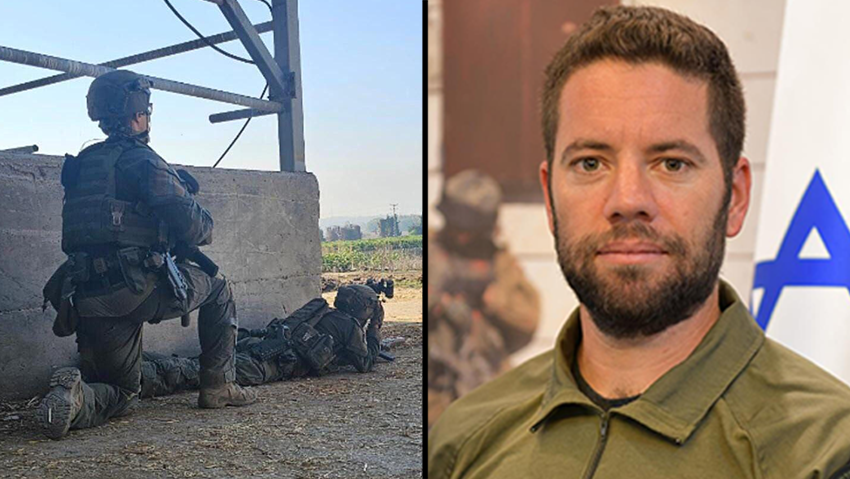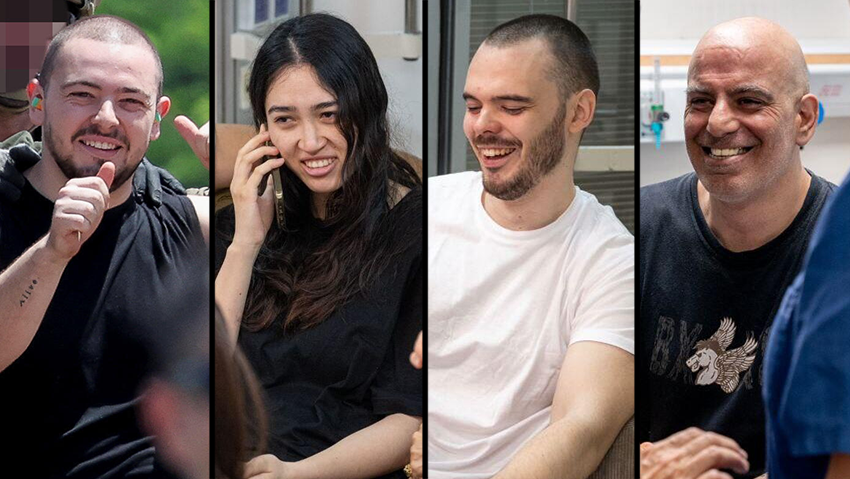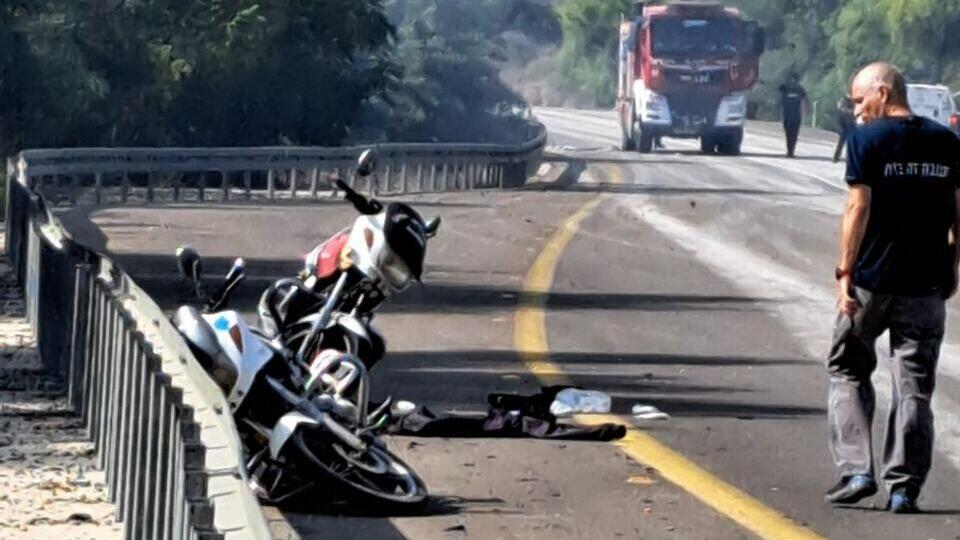Getting your Trinity Audio player ready...
Prime Minister Benjamin Netanyahu announced Saturday that the operation to rescue hostages from Nuseirat in central Gaza would be renamed from "Summer Seeds" to "Operation Arnon," honoring Chief Inspector Arnon Zmora, the police commando who led the rescue team before he was killed.
Zmora was part of the team that entered the building where hostages Almog Meir Jan, 21, Andrey Kozlov, 27, and Shlomi Ziv, 40, were held. Noa Argamani, 25, was held in a separate building, which another team entered simultaneously.
3 View gallery


The battle of Yad Mordechai on Oct 7 and Chief Inspector Arnon Zmora
(Photo: Yad Mordechai, Israel Police)
Zmora, of Israel Police’s Yamam counterterrorism unit, was 36 years old at the time of his death. He left behind his wife, Michal, and two children. Zmora lived in Sde David in southern Israel and, on the morning of October 7, led the Yamam team that helped repel dozens of terrorists from Kibbutz Yad Mordechai.
"We are deeply grieving the loss of our beloved and good Arnon, a devoted family man, gentle father, loving husband and an exceptional friend,” Zmora’s family said in a statement.
“Arnon was a respected fighter, highly attentive to his comrades and their families. He was a man of values with a huge heart, who believed wholeheartedly in the mission of defending the people of Israel, which he carried out with immense dedication and professionalism.
“We heard of Arnon’s heroism mainly from those who met him and fought alongside him, and we will continue to hear more. Arnon was a man of letters and conversation, played the guitar, planned to start his master's degree, loved life and his loved ones. He leaves behind a wife, two children and many who will continue to carry his unique light in their hearts."
Footage from hostage rescue mission in heart of Gaza
(Video: IDF Spokesperson's Unit)
The police noted that Zmora was wounded in Saturday’s heroic operation during a battle with a terrorist in the room where the hostages were held. He was critically injured and later pronounced dead at the hospital.
He is the 11th Yamam casualty since October 7, with nine fighters killed on that day, and Chief Inspector Yitav Lev Halevi who fell last month in an operation in Tulkarm in the West Bank. "Yamam fighters risk their lives for the people of Israel - wherever they are needed," the police said.
The IDF also noted that Zmora fell when he was part of the team that stormed the apartment where the hostages were held. "Chief of Staff Lt. Gen. Herzi Halevi spoke with Yamam Commander Assistant Commissioner H at the end of the complex operation and expressed his great appreciation for the brave and determined actions of the unit’s fighters during the rescue operation and throughout the war. The chief of staff and the Yamam commander agreed that the operation would be called Operation Arnon in the IDF, as a token of recognition for the unit's actions in the war and Arnon's sacrifice," they said.
3 View gallery


Almog Meir Jan, Noa Argamani, Andrey Kozlov and Shlomi Ziv
(Photo: IDF Spokesperson's Unit)
Yael, a friend of Zmora, recounted the battles he took part in on October 7. "Arnon and his team, Team Tequila, arrived at the Yad Mordechai junction on October 7 and fought terrorists there. They saw a police car with officers asking for help. They quickly and heroically neutralized the terrorists and then moved on to Nahal Oz and then to Be'eri, losing comrades at the Keshet junction. They fought all day long."
On October 18, just days after the battle, one of the Yamam fighters who participated said, "We were dispatched without equipment, rushing to Yad Mordechai. As soon as we arrived at the junction, we heard on the radio, 'We're under attack from the front.' We entered with our vehicles, still in our home clothes. They shot at us and immediately fired an RPG at us. Miraculously, it didn't hit."
Yamam forces engaged in battles with terrorists at Yad Mordechai on October 7, alongside Border Police officers and the local alert squad. Yair Waldman, a resident of the kibbutz, said a week and a half after the battle, "It's important to say that Yamam forces saved the kibbutz. This does not diminish the fact that we were rushed to the front line under fire, risking our lives and being ready for the event to spill over to us. But the local alert squad alone could not have stood against two trained Hamas cells."
Alert squad commander Omer Peri said their military security coordinator mobilized the entire squad after the council's security officer reported drones over Netiv HaAsara, a moshav that suffered many casualties.
"We drove to inspect the fence, look for anything unusual, and closed the gates," Peri said. "There was a guy working in the agricultural beehive who tried to save the bees. We told him to get inside, and we closed the gate and let him in. Then we started receiving gunfire at the settlement. Initially, it was from a distance; we understood it was at Netiv HaAsara. Then we saw a large explosion near the fence close to Route 4."
"The security coordinator returned initial fire and ran to the front gate," Peri continued. "We deployed our forces in the western part of the kibbutz. Our luck began when a Border Police unit exiting the kibbutz to fight identified eight motorcyclists approaching and opened fire on them. These were three Border Police officers. Yamam forces, dispatched to the incident, received an early warning around 5 a.m. and an order to head south. They joined the Border Police officers and neutralized the motorcyclist cell."
Later, they identified a truckload of terrorists a few hundred feet from the dairy farm. "They began returning fire. Yamam forces from the initial incident joined us, and we divided them so that some provided cover while others flanked toward the orchard to eliminate the terrorists around the truck," Peri said. "No terrorist entered the kibbutz. That was our luck." Although they received no instructions from the army, it was decided to evacuate all families.
Dairy farmer Itamar Dangi, whose grandfather was killed in the War of Independence and whose father fell in the Yom Kippur War, described the scene: "The battle at the junction was intense, with bullets whizzing by us. We didn't grasp the magnitude of the event. Moments later, we spotted a white vehicle with people on it. Our immediate thought was that it was a terrorist, but the distance made it hard to be sure. Yamam forces engaged them with heavy fire. After the battle calmed down a bit, they left two Yamam fighters with us. The fighting south of the kibbutz continued. Shortly after, we were replaced by soldiers from the Paratroopers, Givati and Golani brigades. I went to feed the cows and was yelled at that it was dangerous. They didn't understand the cows were hungry."






